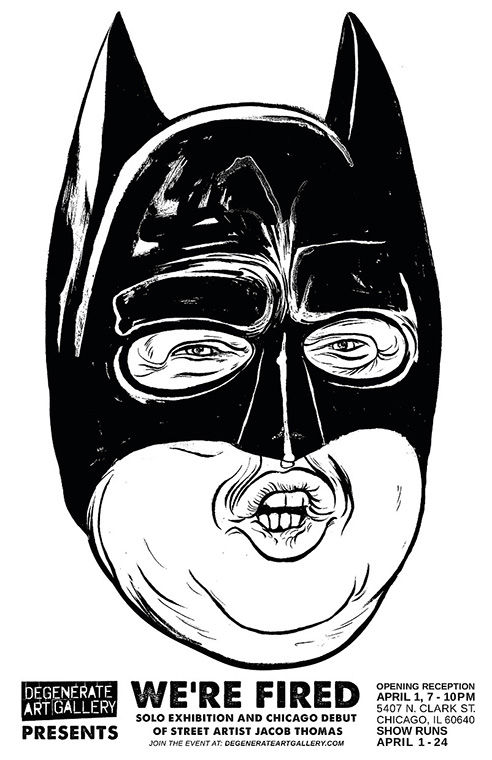Chicago dumps Trump with satire
Jacob Thomas’ Donald Trump-inspired designs are displayed at the Degenerate Art Gallery, 5407 N. Clark St., April 1 through April 24.
April 4, 2016
There is no denying Republican presidential candidate Donald Trump is a polarizing billionaire to many voters.
Between his hyperbolic speeches and overall appearance, parodies of the boisterous figure have flourished throughout the last few months, specifically in the Windy City, as the Republican front-runner’s campaign draws closer to a possible nomination.
Political satire is nothing new. Nearly every president has been the butt of a joke or severe criticism at some point in his career.
While Chicago is known for its central role in the political arena, artists, businesses and filmmakers have put their own spin on the current presidential race. Rather than making such statements through more traditional protests, locals have found their own inimitable ways of satirizing “The Donald”—oftentimes with more comedic and lighthearted approaches.
Iconic Chicago hot dog shop The Wiener’s Circle, 2622 N. Clark St., created the “Trump Footlong,” a hot dog which only measured three inches in length. The Degenerate Art Gallery, 5407 N. Clark St., has a Trump-inspired art exhibit called “We’re Fired!” featuring work from local Chicago-based artist Jacob Thomas and curated by gallery owner Nicholas Zahn through April 24.
Perhaps the most noteworthy take on the Trump persona is Chicago-based performer Fawzia Mirza’s Vimeo short comedy film, “The Muslim Trump,” a mockumentary about “Donald Trump’s illegitimate Muslim daughter.”
Mirza, who plays the character Ayesha Trump, said she felt it was important to give a voice to the Muslim community in the way she knew best—comedy. She said she did not want to make Ayesha a stereotype of what many believe Muslims to be but rather to disprove Trump’s past insinuations about Muslims.
“One of the things that I find as a Muslim in this country [is] you are constantly expected to be the best version of a human being there possibly is,” Mirza said. “Otherwise, how is the majority going to hold you up as like, ‘Look, they’re not all bad people. Look how great this person is.’”
Throughout the last few months, street artists—particularly those who do not usually design politically charged pieces—have created Trump-inspired art. Street artist Hanksy created the “Dump Trump” campaign, and Chicago artist Goons created his “Chump” stickers.
Zahn said he thinks this is happening because Trump is such a polarizing figure to this culturally progressive generation.
“He’s making people angry,” Zahn said. “You’re going to see things showing up more in street art and almost all facets of art and entertainment. He’s a controversial target, and people are trying to voice their concerns in whatever medium they use.”
Jane Dailey, an associate professor of history at the University of Chicago, said this level of political satire has been around for years. However, with social media’s growth, she added that such parodies seem more prevalent today.
“President [Barack] Obama is the exception in terms of the abuse that was heaped on him as a presidential candidate,” Dailey said. “A close second was Abraham Lincoln, who was called ‘Tyrant in Chief’ and ‘Abraham Africanus I.’ There’s been plenty of political satire in years past. Obviously, social media changed things tremendously.”
One of the reasons Trump’s criticism might seem more pervasive today is attributed to the influx of comedy-focused news programs on TV. Between John Oliver’s “Drumpf” segment on “Last Week with John Oliver” and “Saturday Night Live” insinuating Trump supporters were racists in the sketch “Racists for Trump,” political satire might be at an all-time high.
Mirza said while the Oliver and “SNL” segments are relevant, it is important that those minority groups who Trump directly criticizes speak.
“I don’t think John Oliver or people at ‘SNL’ are going to lose any of their jobs over speaking out,” Mirza said. “But if Muslims have to start wearing armbands, I’m suddenly in trouble. It’s important for us to speak out and be elevated.”
Since placing his name across his Wabash Trump Tower in 2014, Trump has made for a wealth of criticism in Chicago. Dailey said because the city has such a large community of artists, performers and comedians—in addition to its political prowess—the city has satirized Trump in its own original ways.
“It brought him into the sights of many in Chicago,” Dailey said. “This happened before he decided to run for President. He’s easy to take aim at, and we have people in the arts who could do it in this city.”








